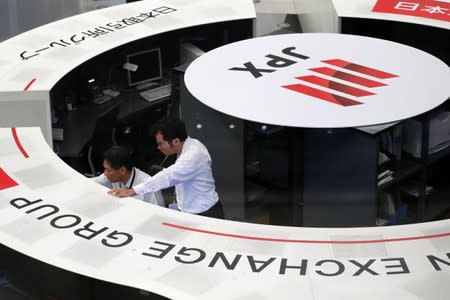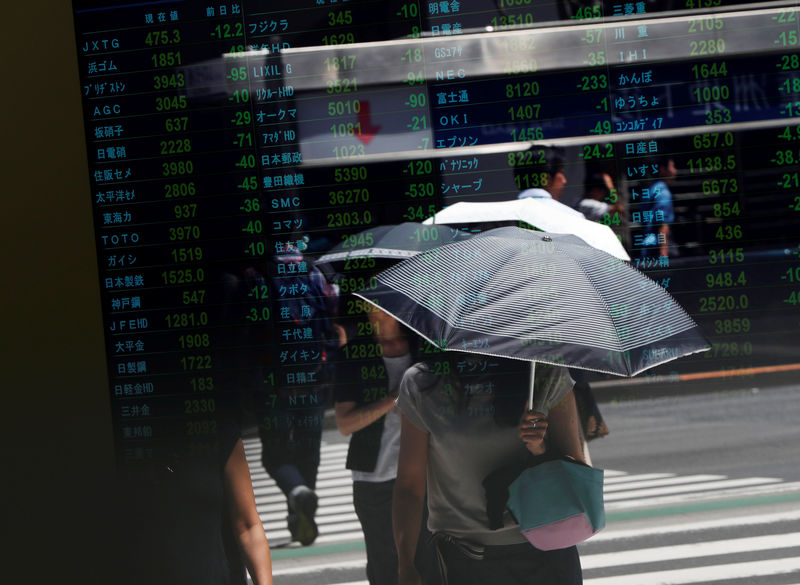
By Hideyuki Sano
TOKYO (Reuters) - Global shares fell to one-month lows on Wednesday after U.S. manufacturing activity tumbled to more than a decade low, sparking worries that the fallout from the U.S.-China trade war is spreading to the U.S. economy.
A slowdown in U.S. economic growth would remove one of the few remaining bright spots in the global economy and come just as Europe is seen as close to falling into recession.
MSCI's gauge of stocks across the globe <.MIWD00000PUS>, covering 49 markets, dipped 0.06% to a low last seen in early September, after shedding 0.83% in the previous session.
European shares are expected to drop, with European stock futures <STXEc1> <FDXc1> <FFIc1> trading down 0.2%-0.4%.
In Asia, MSCI's ex-Japan Asia-Pacific shares index <.MIAPJ0000PUS> dropped 0.6%, with Australian shares <.AXJO> falling 1.3% and South Korean shares shedding 1.5%. Japan's Nikkei <.N225> slid 0.4%. China markets are closed for a one-week holiday.
Hong Kong's Hang Seng index <.HSI> was down 0.3% after a market holiday the previous day. The index fell as much as 1.2% in early trade. On Tuesday, Hong Kong police shot a teenage protester, the first to be hit by live ammunition in almost four months of unrest in the Chinese-ruled city.
Data on Hong Kong September retail sales is due later on Wednesday.
"Nothing other than a terrible number is conceivable here," ING chief Asia-Pacific economist Rob Carnell said in a note, adding that he was watching Hong Kong events "with a growing sense of despair."
Adding to tensions in Asia, North Korea carried out at least one more projectile launch on Wednesday, a day after it announced it will hold working-level talks with the United States at the weekend.
On Wall Street, the S&P 500 <.SPX> lost 1.23% to hit four-week lows.
Selling was triggered after the Institute for Supply Management's (ISM) index of factory activity, one of the most closely-watched data on U.S. manufacturing, dropped 1.3 points to 47.8, the lowest level since June 2009.
A reading below 50 indicates contraction in the manufacturing sector. Markets had been expecting the index to rise back above 50.
(GRAPHIC: U.S. manufacturing - https://fingfx.thomsonreuters.com/gfx/mkt/12/6830/6761/191002i.png)
The data came after euro zone manufacturing data showed the sharpest contraction in almost seven years.
"In terms of the outlook on manufacturing, U.S-China trade talks planned next week is everything. If that goes well, we could well see a V-shaped recovery in the ISM data in coming months," said Hirokazu Kabeya, chief global strategist at Daiwa Securities.
"That means we can't just bet on a further decline in the U.S. economy now. On the whole I don't think we need to change our view that the U.S. economy remains relatively solid," he added.
The poor data lifted the Fed funds rate futures price sharply, with the November contract <FFX9> now pricing in about an 80% chance the U.S. Federal Reserve will cut interest rates on Oct. 30, compared to just over 50% before the data.
U.S. President Donald Trump once again lashed out at the Federal Reserve on Tuesday, saying the central bank has kept interest rates "too high" and that a strong dollar is hurting U.S. factories.
It is another question, however, whether the Fed will cut interest rates as hastily as Trump, and financial markets, want.
"We don't think the Fed will cut rates this month. The Fed will probably want to cut rates in December, looking at the strength of the economy around that time when new tariffs on China will set in," said Toshifumi Umezawa, strategist at Pictet Asset Management.
"Given divides in opinion among Fed policy makers, it will be difficult to come to the conclusion by this month," he added.
Just on Tuesday, Chicago Fed President Charles Evans said the Fed can keep rates for now and there is scope to raise rates slightly over the next few years if the economy continues to grow.
In the currency market, the U.S. dollar slipped from Tuesday's two-year high against a basket of currencies as the ISM survey shook the notion that the U.S. economy will withstand the trade war.
The yen rose to 107.85 yen per dollar <JPY=>, from Tuesday's low of 108.47.
The euro stood at $1.0933 <EUR=>, having bounced off a near 2 1/2-year low of $1.0879 hit on Tuesday.
The Australian dollar fetched $0.6713 <AUD=D4>, having hit a 10 1/2-year low of $0.6672 the previous day after the Reserve Bank of Australia cut interest rates and expressed concern about job growth.
Gold rose to $1,479.80 per ounce <XAU=> from a two-month low of $1,459.50 hit on Tuesday on the back of a robust U.S. dollar.
The weak U.S. data pushed oil prices to near one-month lows, although a surprise drop in U.S. crude inventories helped them to recoil in Asia.
Brent crude <LCOc1> futures rose 0.9% to $59.42 a barrel, after hitting a four-week low of $58.41 on Tuesday, while U.S. West Texas Intermediate (WTI) crude <CLc1> gained 1.4% to $54.36 per barrel after hitting a one-month low of $53.05.
(Reporting by Hideyuki Sano; additional reporting by Noah Sin in Hong Kong, editing by Richard Borsuk and Richard Pullin)
https://finance.yahoo.com/news/global-shares-one-month-low-011014683.html
2019-10-02 06:00:00Z
CBMiSWh0dHBzOi8vZmluYW5jZS55YWhvby5jb20vbmV3cy9nbG9iYWwtc2hhcmVzLW9uZS1tb250aC1sb3ctMDExMDE0NjgzLmh0bWzSAVFodHRwczovL2ZpbmFuY2UueWFob28uY29tL2FtcGh0bWwvbmV3cy9nbG9iYWwtc2hhcmVzLW9uZS1tb250aC1sb3ctMDExMDE0NjgzLmh0bWw





